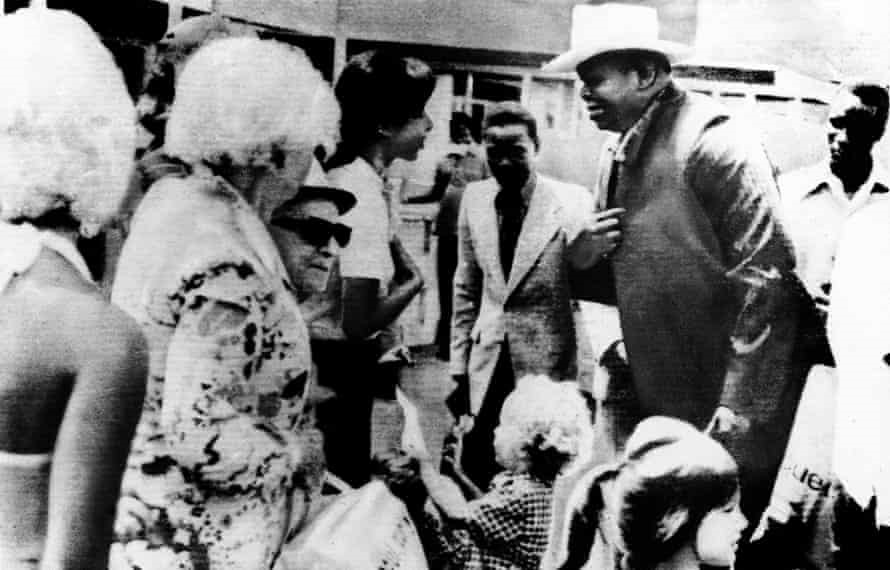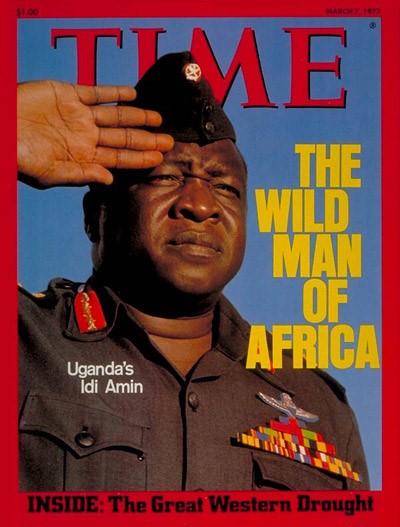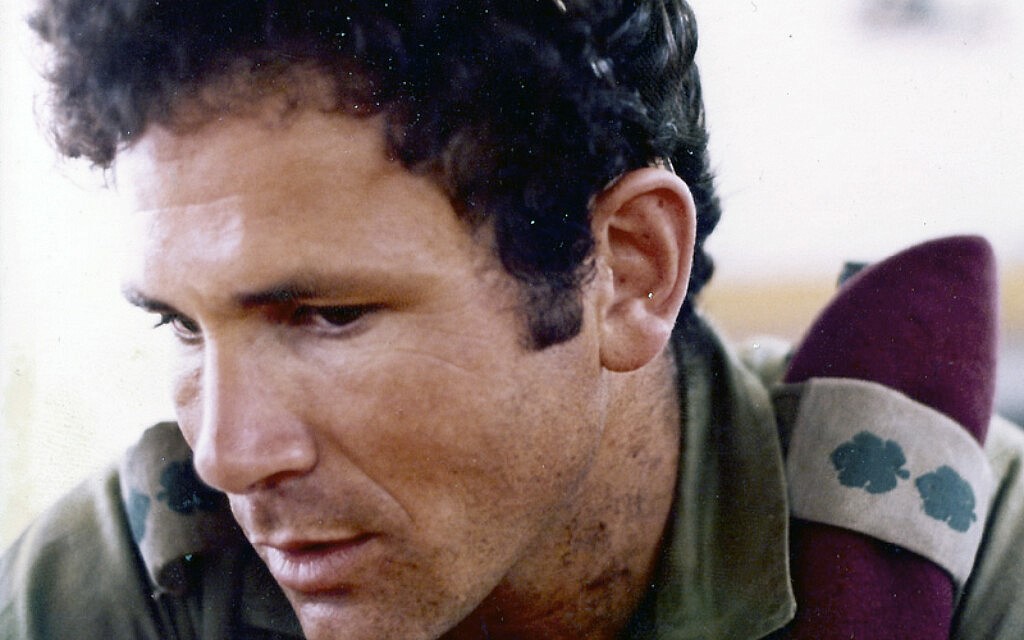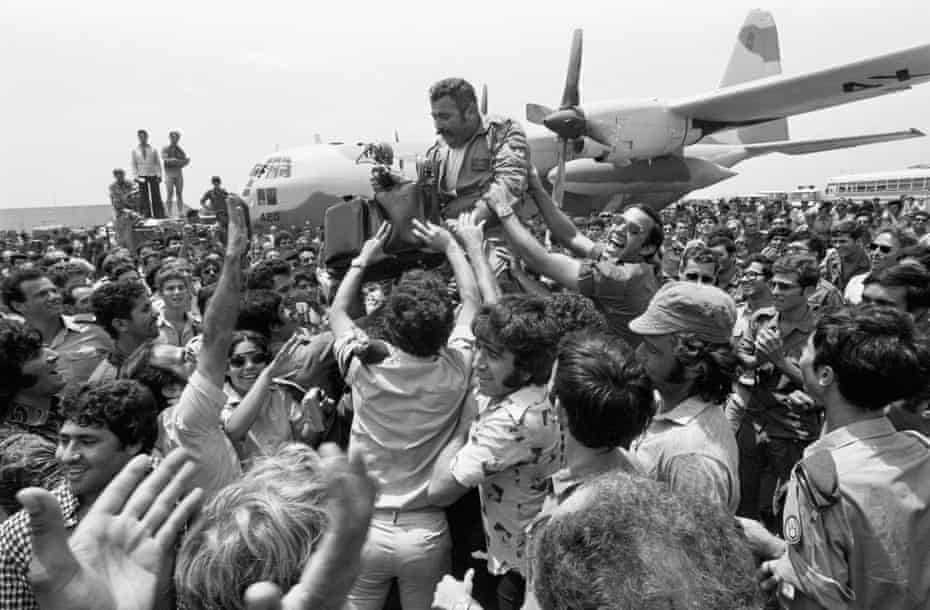It was meant to be just another flight.
Ordinary. Routine. Unremarkable.
No one could have guessed what would happen next.
On 27 June, 1976, an Air France passenger jet departed Tel Aviv, Israel. It flew to Athens for a brief stopover, then continued on to Paris.
On board were 248 passengers and 12 crew. Most of them were Jewish and Israeli.
Just after 12.30pm, violence erupted. Several of the passengers suddenly leapt to their feet, revealing themselves to be militant radicals.
They brandished pistols and grenades, yelling threats as they stormed the cockpit, taking control of the aircraft.
- Two of the hijackers were German. They belonged to a group known as Revolutionary Cells.
- Two more hijackers were Palestinian. They belonged to a group called the Popular Front for the Liberation of Palestine.
Now the seized aircraft was diverted to Libya for refuelling. Then it was diverted again to Uganda.
On 28 June, at 3.15pm, the Air France flight touched down at Entebbe Airport.
Idi Amin, the Ugandan president, was there to welcome the terrified hostages with open arms.

Idi Amin meets the hostages. Source: The Guardian
Outwardly, Amin was flamboyant and charming — but the undercurrent of menace was impossible to miss. They were his unwitting guests now, subject to his mercy.
The irony was a bitter one.
Once upon a time, Amin had been friendly with Israel. But now he was collaborating with Israel’s enemies to hold Jews captive.
So…how did it come to this? And what happened next?
Becoming a despot

Source: Time
Idi Amin had humble roots. He was born in 1925 into a rural-farming background. His father abandoned him at a young age, leaving him to be raised by his mother’s family.
Amin was a natural athlete, passionate about rugby and boxing. By contrast, he was a poor student, with no inclination towards academics. So, when he left school, he only had the equivalent of a 4th grade education.
Amin became a drifter, working a string of odd jobs. Eventually, he joined the British colonial army. This is where he excelled and found his life’s purpose. He saw action in Somalia and Kenya, where he developed a reputation for ferocity and boldness.
In 1962, Uganda gained independence. Amin rose through the ranks quickly, and by 1970, he became the commander of the armed forces.
At the time, the prime minister was Milton Obote, a close friend of Amin’s. For a while, it looked like a match made in heaven. Obote was a savvy political operator, and Amin acted as the military muscle.
In the turbulence of post-colonial Africa, an alliance like this was critical.
However, the relationship grew rocky when Obote started to lose confidence in Amin. In 1971, Obote made moves to arrest Amin and strip him of his power. But Amin was more cunning and acted first — executing a swift coup to topple Obote.
Now in complete control of Uganda, Idi Amin declared himself president for life. And he set about reshaping the fabric of the nation in his paranoid image:
- He created an intelligence agency — the State Research Bureau (SRB) — to root out and eliminate any opposition to his rule.
- He built prisons to torture and ‘disappear’ people at whim.
- He executed members of his own staff for perceived disloyalty.
- He carried out ethnic cleansing by expelling citizens of South Asian descent from Uganda.
- He allegedly even murdered and dismembered his fourth wife for infidelity.
Amin’s acts of terror verged on madness — and international support for his regime rapidly evaporated as more and more countries found his conduct reprehensible.
One nation, in particular, was feeling buyer’s remorse: Israel.
In the years following Uganda’s independence, the Israelis had been a close ally. They had been responsible for supplying and training the Ugandan military.
In fact, if you look closely at photos of Idi Amin in uniform, you can’t possibly miss the medals decorating his chest. Among them? Well, the wings of the Israeli Air Force, prominently displayed. A clear indication of the friendly ties between the two nations.
In the documentary Inside the Mossad, former Israeli spies reveal that this happened because of the political realities at the time. Israel needed diplomatic recognition from as many countries as possible, and Uganda needed materials and expertise.
So…hand in glove…this marriage of convenience was considered a win-win.
In fact, as late as 1971, Amin made an official visit to Israel and was given a warm reception by his benefactors.
However, by 1972, the relationship imploded.
The turning point came when Amin visited Libya and met with fellow dictator Muammar Gaddafi. In a wild twist, Amin suddenly decided to embrace a new ideology. He became pro-Palestine and anti-Israel.
The Israelis were stunned. They had helped elevate a volatile leader who had now turned on them. They had no choice but to withdraw their support of Uganda.
Amin bristled at this. And what he did next was shocking. He decided to collaborate openly with Israel’s enemies.
Becoming a war hero
Meanwhile, elsewhere in the world, another man’s journey was beginning. Another man’s personality was taking shape.
His name was Yonatan Netanyahu, and he went by a memorable nickname: Yoni.

Source: Stand with Us
Yoni was born in 1946 in New York. He came from a family with a distinguished pedigree.
- His father was a professor emeritus of history.
- His paternal grandfather was a rabbi.
- The Netanyahus, as a whole, were ardent Zionists, with roots in both Eastern Europe and the Middle East.
In 1949, following Yoni’s father’s stint at Cornell University, the family returned to a newly independent Israel. These formative years would cement Yoni’s identity. He grew up to become the personification of a ‘warrior-poet’.
In 1967, Yoni served as a paratrooper and saw action during the Six Day War. Shortly after, he returned to the United States, where he pursued further studies at Harvard University. He excelled in philosophy and mathematics. He was such a good scholar that he ended up on the dean’s list.
However, his patriotism eventually led him to abandon his studies. In 1969, he re-enlisted once more in the Israeli military, embracing what he believed to be his destiny.
Yoni was a prolific writer, penning many letters to his family, where he explained his outlook on life:
‘I would rather live here with ongoing fighting than be part of a wandering Jewish people…because I have zero intention of telling my grandchildren of a Jewish state that [existed] in the 20th century as a short, passing episode in a millennia of wandering Jews.’
In 1970, Yoni joined Israel’s famed special-operations unit — Sayeret Matkal. In 1972, he became deputy commander of the unit. He saw action in Syria and Lebanon, displaying both calm and courage under fire.
Yoni was only in his 20s, but already, he was considered a legend.
In the aftermath of the Holocaust, where Jews had been stereotyped as being timid and passive victims, Yoni seemed to represent the perfect counterpoint.
He was robust. He was vibrant. He was, quite literally, a thinking man’s soldier.
This was a dramatic shift for Jewishness — and in this regard, Yoni had found his life’s true calling.
His most decisive moment, however, was yet to come.
The events at Entebbe
Hours now stretched into days.
The Air France hostages were being held at the Entebbe Airport terminal while the hijackers demanded the release of fellow militants imprisoned primarily by Israel.
They gave a deadline: 1 July.
If their demands were not met, they would begin killing hostages.
Israeli Prime Minister Yitzhak Rabin found himself in a bind. Officially, Israel had a strict policy of not negotiating with militants. However, privately, there was a feeling of gnawing anxiety.
The memories of the 1972 Munich Olympics were still fresh in everyone’s minds. Back then, Israeli athletes had been murdered, even as the world stood by helplessly and watched.
Could such a tragedy happen again?
It was terrifyingly possible.
Clearly, something had to be done.
- Unofficially, the task of backdoor diplomacy fell to Baruch Bar-Lev. He was a retired Israeli military officer who knew Idi Amin. Several phone calls were arranged.
- More diplomacy was attempted by Arab figures such as Anwar Sadat and Yasser Arafat. They sent representatives directly to Uganda to appeal to Amin.
- As the negotiations dragged on, some progress was achieved. Most of the non-Israeli hostages were released.
- However, the hijackers stubbornly held on to the Israelis. Clearly, they were high-value prisoners.
- Remarkably, all 12 of the Air France crew members refused to leave, even when they were offered freedom. They decided to stay in solidarity with the Israeli passengers.
Eventually, there were 106 hostages left.
By now, the tensions had reached boiling point.
It appeared that the militants were growing frustrated and edgy.
The Israeli leadership sensed they could wait no more.
It was time to pull the trigger.
Operation Thunderbolt
‘Power projection’ is critical.
This is a political term that refers to a nation’s capacity to conduct military operations beyond its borders. This ability is closely tied to regional and global influence.
Ultimately, it’s what separates goliaths like the United States from everyone else — the capability to deploy forces abroad, then sustain them for extended periods of time.
This is why the United States is known as a superpower. It has the unique ability to impose foreign policy from a position of strength.
Unfortunately, in 1976, Israel was most certainly not a superpower. It was a small nation with limited resources. The Israelis did not have military bases abroad. They did not have strategic assets like aircraft carriers. They didn’t even have formal military alliances with countries willing to support them openly against Idi Amin.
In short, Israel did not have the ability to project power beyond its borders.
This was bad news because the logistical challenge of entering Uganda for a rescue mission was indeed daunting. The Israelis would have to fly over 4,000km, crossing into the airspace of several nations hostile to their presence.
Any number of things could go wrong.
- They could be intercepted en route.
- They could be shot down.
- They could be surrounded by enemy troops, outnumbered, with no hope of backup.
No doubt, the level of risk was extraordinarily high.
Everyone was nervous.
And yet…in a gutsy call…the Israelis decided to press ahead with the op anyway.
They called it Operation Thunderbolt.
- Intelligence was painstakingly gathered. Movements were carefully choreographed. And on the evening of 3 July, an Israeli task force went airborne.
- It comprised of 100 personnel, flying in a fleet of cargo planes. The task force carried everything they needed with them: medical equipment, ground vehicles, command-and-control facilities. It was all or nothing.
- Fortunately, the Israelis had at least one foreign friend willing to help them out. The Kenyans was sympathetic to their plight, and had agreed to offer covert assistance in refuelling mid-journey.
- This allowed the task force to move smoothly across borders without incident, and they safely touched down in Entebbe at 11.00pm.
- Upon landing, a team of Israeli commandos fanned out. They secured the runways and formed a defensive perimeter, protecting their planes. Another round of refuelling needed to be done on the ground, and there could be no room for error. The task force had to be ready for take-off at a moment’s notice.
- Meanwhile, another Israeli team ventured out to destroy a squadron of MiG fighter jets parked on an airstrip close by. Again, there could be no room for error. They needed to neutralise Uganda’s ability to deploy air power against them.
- Finally, the main assault team was led by Lieutenant-Colonel Yonatan ‘Yoni’ Netanyahu. And they had the most dangerous job of all. They had to penetrate the airport terminal, neutralise the opposition, and rescue the hostages.
The Mossad — Israel’s foreign intelligence service — had already gathered extensive information on the layout of the building, as well as the size and composition of the enemy. So they had a good idea of what they were going into.
To gain an additional advantage, Yoni and his team relied on the element of surprise. They rode across in the tarmac in a convoy. It was made up of a Mercedes limousine that was a duplicate of a vehicle Idi Amin regularly used, along with Land Rovers as escorts.
This illusion allowed them to close in on the terminal before starting their raid.
- During the battle, all the hijackers were killed.
- Up to 45 Ugandan soldiers were also killed.
- Unfortunately, during the crossfire, three hostages also lost their lives.
- The most poignant tragedy was saved for last. Yoni was felled by enemy bullets while evacuating the civilians. He died in the arms of his comrades. He represented the only casualty suffered by the task force.
In just 90 minutes, Operation Thunderbolt was accomplished.
The commandos and the freed hostages were airborne, and against all the odds, they were going home to Israel.
The aftermath of Entebbe

Celebrations in Israel. Source: The Guardian
When Idi Amin learned about the raid, he descended into a rage. And he had two final acts of vengeance to inflict.
Unfortunately, there was one remaining Israeli hostage who had been left behind in Uganda. Her name was Dora Bloch, and she was in her mid-70s. She had become ill during her captivity and was taken to a hospital in Kampala for treatment.
This happened just before the Israeli task force arrived at Entebbe. Which meant they were not able to rescue her.
Sadly, Bloch became the target of Amin’s wrath — and he ordered her to be murdered.
In addition, Amin also learned of Kenya’s complicity in the raid. So, in retaliation, he ordered the massacre of over 200 Kenyans living in Uganda, forcing the survivors to flee as refugees.
But Amin’s reign of terror wouldn’t last for much longer. Three years later, in 1979, he was finally ousted from power when he lost a war against neighbouring Tanzania.
Amin would escape to Saudi Arabia, where he lived in exile until his death in 2003. A disgraceful end for a disgraceful man. Few, if any, mourned his passing.
By contrast, Yonatan Netanyahu is celebrated as a national hero in Israel. He’s immortalised as a symbol of courage and perseverance in the face of impossible odds.
Soldier. Patriot. Martyr.
Yoni was only 30 when his life was cut short at Entebbe. And he died just as he had lived: with valour and distinction.
Maybe it was his destiny.
In 1969, just as he abandoned his university studies and re-enlisted in the military, Yoni wrote a letter to his parents. It seemed to foreshadow what was to come, revealing the depths of his character:
‘In another week I’ll be 23. On me, on us, the young men of Israel, rests the duty of keeping our country safe. This is a heavy responsibility, which matures us early… I do not regret what I have done and what I’m about to do. I’m convinced that what I am doing is right. I believe in myself, in my country and in my future.’
Indeed, spoken like a true warrior-poet.
Lessons for investors
The Entebbe rescue mission — Operation Thunderbolt — continues to be studied in military academies around the world.
It’s become a textbook example of how a small nation with limited resources can make remarkable gains by using ingenuity, fortitude, and research.
Louis Pasteur, the French scientist, reflected this kind of thinking perfectly when he said: ‘Chance favours the prepared mind.’
So, as an investor, here are the critical lessons you need to consider as you map out your own blueprint for success:
- Do a complete audit of your strengths and weaknesses. The more you understand about yourself and your goals, the more effective you will be at creating a balanced, risk-managed portfolio.
- Apply a margin of safety. You should never take anything for granted. The market is always dynamic, always changing. Rehearse how you will respond and adapt to the trends in front of you.
- Develop conviction and follow through. Decisions are seldom black and white, and the road to success won’t always be clear-cut. You will need stamina and discipline to reach your destination.
In our Quantum Wealth Report, we are currently exploring global opportunities in property, infrastructure, energy, technology, and so much more.
It’s about giving you the best financial intelligence — so you can find the inspiration to accomplish your own Operation Thunderbolt.
Regards,
John Ling
Analyst, Wealth Morning





John is the Chief Investment Officer at Wealth Morning. His responsibilities include trading, client service, and compliance. He is an experienced investor and portfolio manager, trading both on his own account and assisting with high net-worth clients. In addition to contributing financial and geopolitical articles to this site, John is a bestselling author in his own right. His international thrillers have appeared on the USA Today and Amazon bestseller lists.